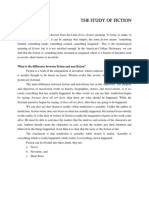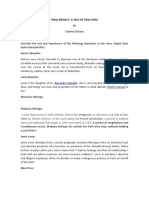Clothes Make The Man
Clothes Make The Man
Uploaded by
Anna ComanCopyright:
Available Formats
Clothes Make The Man
Clothes Make The Man
Uploaded by
Anna ComanOriginal Title
Copyright
Available Formats
Share this document
Did you find this document useful?
Is this content inappropriate?
Copyright:
Available Formats
Clothes Make The Man
Clothes Make The Man
Uploaded by
Anna ComanCopyright:
Available Formats
Clothes make the man by Henri Duvernois Henri Duvernois,was writer, screenwriter and playwright French,was born - March
h 4, 1875 in Paris, th city where h died January 30, 1937. Clothes make the man is a short story which has impressed a lot of readers. The story is about three robbers planned to rob a home . Two of the gang would do the job. The third robber, a man named Tango would stand watch in a policemans uniform. Anyone passing by would not suspect a problem since there would be a policeman on patrol.He liked the fact that he had a shiny whistle, just like a real policeman.He began to change his outlook . And so he began to act like a policeman. He proudly gave a salute to a passing police lieutenant, helped an old woman across the street, and even decided to take a drunk who was disturbing the peace to jail. Meantime his two fellow robbers came running out of the house they were robbing to stop him. his two fellow robbers came running out of the house they were robbing to stop him. . One robber said, You blockhead. Youll ruin the whole job. What are you doing? And then he struck him across the face. Something snapped inside Tango. He remembered the lieutenant answering his salute. He remembered the gratitude and admiration of the old lady he helped across the street. Tango liked playing the role of policeman.And so as his companions looked on in horror, Tango stuffed the shiny whistle into his mouth and blew a salvo of blasts long enough to bring all the police in Paris. He yelled, Crooks, robbers! I arrest you. I arrest you in the name of the law. In the end Tango understand that sometimes clothes do make the man. The type of title belongs to human reality , especially its referred to the philosophical one , because contains abstract ideas, possibilities concerning human life clothes make the man it is equal to to be judged by the way you dress . The titles contains two functions : orientative and informative . The first because between the title and the text is a close connection .The last-informative function because the author transmits the key of information from the text in the most concise and precise manner . The titles is an aphorism meaning that you cannot judge a person solely by his appearance. The narrative genre is prose , by the narrative code the text is short story and can be considerated as a psychological test, and the narrative modes are description and dialogue . Themes : theft , social classes , clothes. Functional style : publicistic . The main idea is Clothes make the man it means that clothes make the person, because if reflects profession and social status of people. Clothes also reflect peoples values and beliefs. By dressing the way you want, clothes can help a person express his or her personality and create a unique personal image. The message : We can judge a mans character from his dress; But its not always so. Dress can only help us to a certain extent in knowing the broad facts of a mans character. A man who wears a costly dress is necessarily a man of lavish habits. On the other hand, a man who wears tattered clothes is not necessarily a man of miserly habits. He may be do so only due to his financial limitations. Yet it is true that in some cases dressserves as a useful index to the character of a man. Characters : Three robbers - Mireault , Eel ,Tango ; lieutenant , old lady and drunkard .The main character is Tango robber, poor, ambitious . He is considere the antagonist of the story , over the time he becomes a good and wise man. The way of presenting the characters is indirect or explicit ,that author describes our character by the action ,external appearance ,human environment family,social class ( the three robbers , lieutenant , old lady and drunkard) ,material wealth . I think that this text is actually because throughout the years, people have generated many stereotypical names or concepts for people based off of the way they dress . Some are good and some not so
much, but we can't judge the appearence by her clothes , but before you have the chance to talk to him, to see how he thinks we understand that not clothes make the man but man make the clothes
You might also like
- Paul Auster City of GlassDocument7 pagesPaul Auster City of GlassAndrea Gyülvészi100% (1)
- Narrative TechniquesDocument4 pagesNarrative TechniquesAyaz Ali100% (2)
- Scents and Identification in in The Skin of A Lion by Ondaatje - Giordano - Essay For Umea University, Sweden, Fall 2009Document9 pagesScents and Identification in in The Skin of A Lion by Ondaatje - Giordano - Essay For Umea University, Sweden, Fall 2009ManlioGiordano100% (1)
- What Is FictionDocument15 pagesWhat Is Fictionerika NunezNo ratings yet
- Clothes Make The ManDocument3 pagesClothes Make The ManRachel Demesa Badaguas0% (1)
- English: Quarter 3 - Module 1Document35 pagesEnglish: Quarter 3 - Module 1Manelyn Taga100% (1)
- Yellow & Brown Hand-Drawn Process Writing Proofreading Essay Worksheet - 20240321 - 131903 - 0000Document3 pagesYellow & Brown Hand-Drawn Process Writing Proofreading Essay Worksheet - 20240321 - 131903 - 0000curryganotisijrNo ratings yet
- Tommy's Burglar O'Henry O'Henry's Real Name Was William Sydney Porter, Writer of 20 Century. His Works Have BeenDocument3 pagesTommy's Burglar O'Henry O'Henry's Real Name Was William Sydney Porter, Writer of 20 Century. His Works Have BeenLiliaNo ratings yet
- Detective Fiction - An IntroDocument6 pagesDetective Fiction - An Introsaranya.aven026No ratings yet
- Critique PaperDocument4 pagesCritique PaperVenice Laureign AgarpaoNo ratings yet
- The Man of CrowdDocument12 pagesThe Man of Crowdsheir866No ratings yet
- The Impact of School Uniforms On Student PerformanceDocument2 pagesThe Impact of School Uniforms On Student PerformanceVenice Laureign AgarpaoNo ratings yet
- Point of ViewDocument8 pagesPoint of ViewDiyah FitriNo ratings yet
- Realistic Elements in Guy de Maupassant's Story "A Piece of String"Document12 pagesRealistic Elements in Guy de Maupassant's Story "A Piece of String"Iqra AmjadNo ratings yet
- An Analysis of The Cop and The AnthemDocument4 pagesAn Analysis of The Cop and The Anthemquynhthy189100% (3)
- The Murders in The Rue Morgue SummaryDocument8 pagesThe Murders in The Rue Morgue Summaryjasminespalmadobcc26No ratings yet
- Introduction To Literature II: Gul Aizaz Department of English Abdul Wali Khan University MardanDocument35 pagesIntroduction To Literature II: Gul Aizaz Department of English Abdul Wali Khan University Mardanali khanNo ratings yet
- ABC of FictionDocument23 pagesABC of Fictionnasrullah2958No ratings yet
- 1678040386954035Document2 pages1678040386954035SSNo ratings yet
- The Study of Fiction1Document7 pagesThe Study of Fiction1tobleronechoooNo ratings yet
- Detective Story: Discussant: Ma. Cheska Kaye BendalDocument18 pagesDetective Story: Discussant: Ma. Cheska Kaye BendalMa. Cheska Kaye BendalNo ratings yet
- Philippine LiteratureDocument17 pagesPhilippine LiteratureSapphire AmethystNo ratings yet
- Novel in Language EducationDocument20 pagesNovel in Language EducationAlur bebasNo ratings yet
- Narrative ElementsDocument2 pagesNarrative ElementsChristina KaravidaNo ratings yet
- Comparing and Contrasting The Various Lit. GenresDocument60 pagesComparing and Contrasting The Various Lit. GenresLarry ErbiteNo ratings yet
- Kind of Prose Fiction and Non-FictionDocument6 pagesKind of Prose Fiction and Non-FictionJimmy G. Kawengian Wg NnZz50% (2)
- The Piece of String Short Story Project: Grade:96%Document7 pagesThe Piece of String Short Story Project: Grade:96%sofia mafiaNo ratings yet
- Khôlle D'anglaisDocument2 pagesKhôlle D'anglaisSamuel BoulyNo ratings yet
- Practical Class 2-3Document5 pagesPractical Class 2-3Jahan NepesowaNo ratings yet
- The Man of The Crowd SummaryDocument7 pagesThe Man of The Crowd SummaryJarod López AKA HAKAINo ratings yet
- The Cop and The Anthem.Document2 pagesThe Cop and The Anthem.Lauren Obrien100% (3)
- Short StoryDocument35 pagesShort StoryaawweessvvNo ratings yet
- Bonnot GangDocument19 pagesBonnot GangMatías Alaiu50% (2)
- Fiction: Call of The WildDocument3 pagesFiction: Call of The WildCrisanto C. MarsabaNo ratings yet
- Solo Sax AK SummuryDocument3 pagesSolo Sax AK SummuryAA BB MMNo ratings yet
- Bege 108 Solved Assignment 2018-19Document12 pagesBege 108 Solved Assignment 2018-19IGNOU ASSIGNMENTNo ratings yet
- What Is Flash Fiction?Document9 pagesWhat Is Flash Fiction?Maryhazel RualesNo ratings yet
- GCSE Analysing FictionDocument95 pagesGCSE Analysing FictionRasha Hassan MukhtarNo ratings yet
- The Double Life: “He loved her so much that it almost took his breath away”From EverandThe Double Life: “He loved her so much that it almost took his breath away”No ratings yet
- Moll Flanders EssayDocument5 pagesMoll Flanders EssayAndreia MihailaNo ratings yet
- The Cop and The AnthemDocument2 pagesThe Cop and The AnthemThị Thu Tâm Phạm100% (1)
- Topic 60Document7 pagesTopic 60MARIA ELISABET GRAS CALVONo ratings yet
- Examples of Narration - 3 Main Types in LiteratureDocument5 pagesExamples of Narration - 3 Main Types in Literaturerudenko.olenaNo ratings yet
- Types of Narrative Technique in British-American LiteratureDocument6 pagesTypes of Narrative Technique in British-American LiteratureFruzsee89No ratings yet
- E. Hemingway - The KillersDocument3 pagesE. Hemingway - The Killersrobinhaze50% (2)
- PP Conventions of The Crime Genre For ConnectDocument15 pagesPP Conventions of The Crime Genre For ConnectkeiNo ratings yet
- Project+works CitedDocument34 pagesProject+works Citedjasjisha4No ratings yet
- Doctor Manette:: Final Project: A Tale of Two CitiesDocument4 pagesDoctor Manette:: Final Project: A Tale of Two CitiesNathalia GonzálezNo ratings yet
- Metafiction and Parody in The French Lieutenant's WomanDocument6 pagesMetafiction and Parody in The French Lieutenant's WomanCarlos SchmittNo ratings yet
- What Is A Novel Definition and CharacteristicsDocument9 pagesWhat Is A Novel Definition and Characteristicsmmeerab095No ratings yet
- Chandler PDFDocument18 pagesChandler PDFSecret SecretNo ratings yet
- SUMMER 24 LECTURE CRIME FICTION - MGDocument29 pagesSUMMER 24 LECTURE CRIME FICTION - MG台師大高瑪麗No ratings yet
- Sub-Genres of NovelDocument16 pagesSub-Genres of Novelamna latif0% (1)
- Aspects of the novelDocument17 pagesAspects of the novelMohammed El AkroudNo ratings yet
- Wuolah-Free-The Long GoodbyeDocument3 pagesWuolah-Free-The Long GoodbyeM RNo ratings yet
- The Cask of Amontillado Questions AssignmentDocument3 pagesThe Cask of Amontillado Questions Assignmentnishy2995No ratings yet
- Comprehension Reading in Past Progressive Tense-Nanci OspinaDocument3 pagesComprehension Reading in Past Progressive Tense-Nanci Ospinacesar mendezNo ratings yet
- Class 6 MT 4 Question PapersDocument4 pagesClass 6 MT 4 Question PapersshockblasterlolNo ratings yet
- Civics - Rural AdministrationDocument2 pagesCivics - Rural Administration7A04Aditya MayankNo ratings yet
- Broken Shooting ScriptDocument119 pagesBroken Shooting ScriptKat ThomasNo ratings yet
- PDFViwer AspxDocument8 pagesPDFViwer AspxPuneet SapoliaNo ratings yet
- FINLANDDocument15 pagesFINLANDCristyl Vismanos GastaNo ratings yet
- Pakistan Current Affairs MCQsDocument772 pagesPakistan Current Affairs MCQsKb AliNo ratings yet
- Engage 2 Unit 3 PAST CONTINUOUSDocument5 pagesEngage 2 Unit 3 PAST CONTINUOUSCarina PerriNo ratings yet
- FBI Defensive Systems Unit Ballistic Research Facility FBIAcademyDocument21 pagesFBI Defensive Systems Unit Ballistic Research Facility FBIAcademyWalmor Silva de Souza100% (1)
- Pop ManualDocument326 pagesPop ManualSinagTala100% (2)
- Kiss of A Killer (Sweet Valley High Book 128)Document122 pagesKiss of A Killer (Sweet Valley High Book 128)Joroge BuîNo ratings yet
- Lea Mock BoardDocument10 pagesLea Mock BoardRenz Dela CruzNo ratings yet
- Hotel Security Survey Standard TemplateDocument5 pagesHotel Security Survey Standard TemplateSanjit PaulNo ratings yet
- NH&MP, E&D Rules, 2016Document10 pagesNH&MP, E&D Rules, 2016Ali IrtazaNo ratings yet
- General Officer AssignmentsDocument7 pagesGeneral Officer AssignmentscjbgsbnkNo ratings yet
- Salient Provisions of R.A. 6975, R.A. 8551 and R.A. 9708Document21 pagesSalient Provisions of R.A. 6975, R.A. 8551 and R.A. 9708Elaiza Kathrine CleofeNo ratings yet
- PIL 155 of 11Document25 pagesPIL 155 of 11Kondekar SiddiqueNo ratings yet
- Empowerment TechnologiesDocument16 pagesEmpowerment TechnologiesRalph Laurence Bibar CatacioNo ratings yet
- William Burroughs, 'Do You Love Me?' and 'Operation Rewrite' From Any Edition of The Ticket That Exploded, 1962Document7 pagesWilliam Burroughs, 'Do You Love Me?' and 'Operation Rewrite' From Any Edition of The Ticket That Exploded, 1962Jess and MariaNo ratings yet
- Davis EmailDocument3 pagesDavis EmailHouston ChronicleNo ratings yet
- SI in CAPF 2013Document1 pageSI in CAPF 2013Vibhav DixitNo ratings yet
- Kolkata The Statesman 1 ST AUGUST 2020 Page 1Document1 pageKolkata The Statesman 1 ST AUGUST 2020 Page 1reanimation.start9049No ratings yet
- Pablo Escobar A Life From Beginning To End (Hourly History) (Z-Library)Document39 pagesPablo Escobar A Life From Beginning To End (Hourly History) (Z-Library)ybsengaussNo ratings yet
- Advanced Ejercicios de PhrasalsDocument6 pagesAdvanced Ejercicios de PhrasalsSoleNo ratings yet
- Red Team ChecklistDocument2 pagesRed Team ChecklistChristine Joy BautistaNo ratings yet
- Annexure ADocument3 pagesAnnexure AMr MathipsNo ratings yet
- Display PDFDocument15 pagesDisplay PDFpiyush262144No ratings yet
- PrefaceDocument16 pagesPrefaceAnand BiradarNo ratings yet
- Display PDFDocument26 pagesDisplay PDFPiyush DeshmukhNo ratings yet
- Kian Delos Santos: Case BackgroundDocument9 pagesKian Delos Santos: Case BackgroundJokkaz SP. LatigarNo ratings yet

























































































